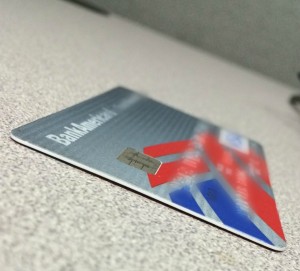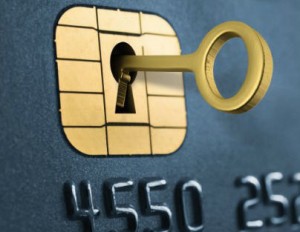Phoenix TS Intern

As of today, MasterCard and Visa announced they created a working group focusing on improving payment security with an initial adoption of chip-and-PIN technology for credit cards. What does this mean?
If you live in the US and haven’t done your research on this emerging technology, you’re not alone. However, the days you have left with your current credit or debit card are numbered. Chip-and-PIN is replacing the familiar swipe-and-sign system in the US, so we thought we’d bring you up to speed.
You probably have numerous questions about the new technology. Why the switch? Does it protect my information better? Is this a reaction to the recent data breaches?
What does chip-and-PIN have that my card doesn’t?
Chip-and-PIN or EMV cards are gaining popularity in the US as a more secure alternative to swipe-and-sign methods. You can tell the difference between the two because chip-and-pin cards have a small microprocessor chip embedded in the card; this chip allows your old magnetic strip the same functionality while encrypting sensitive information. This added security is great news for consumers, especially in light of recent financial breaches. However, the technology isn’t new.
Chip-and-pin has been in development since the 1960s and it became standard in most of Europe in the early 2000s. Like certain recent Olympic events, the US is kind of in last place when it comes to this technology (Too soon?).
Not for no reason either – in order for EMV to become the standard in US retail, the financial industry must undergo an entire infrastructure revamp. The US is a huge market for that kind of project. Every single credit card as well as every card-reader machine at retailers has to be replaced. But the added security benefits may prove worthwhile.

Hack-Resistant but not Hack-Proof
An encrypted microchip in your credit card is definitely a step up security-wise, but not as big a step as you might think. The chip makes it nearly impossible for a thief to duplicate the information on a swiped card and use it. However you’re still at risk anywhere you submit your credit card information into a form. Chip-and-PIN protects you in-store, but not online.
Some people seem opposed to the switch to chip-and-PIN. User testimonials in Europe complain about less protection in cases of fraud, but US banks assure consumers that this will not be the case. The suggestion that the US retail market support both chip-and-PIN and chip-and-sign has received a lot of backlash. The VP of the National Retail Federation belittled the technology, calling it “a half-baked solution” and a waste of money. Chip-and-PIN is a good start, but it is certainly not a standalone solution to financial fraud.
How does the technology compares to newer, private financial startup solutions such as Loop’s Virtual Wallet or Coin’s Universal Card? These companies promise added security benefits in addition to innovation. Is universal chip-and-PIN a safer bet than private security measures? Or perhaps more importantly, will they offer compatibility sometime in the near future?
Are you ready to switch to a smart card?
Technically, you don’t really have a choice. Chip-and-PIN cards are options now at many big banks, but all of the large card companies (Visa, MasterCard, Discover, American Express) announced plans to make these cards standard within the next two years. Recent urges from legislators only expedite the process.
The adoption of this system does rely on the compliance of retailers. They’ll have to buy new card readers for the technology for a successful and effective transition. Business owners may refuse at first because of the price, but new liability rules might change their minds. A representative from MasterCard confirmed in an interview that under new standards the party (bank or retailer) with the more out-of-date technology bears the responsibility of any instance of card fraud. So it may be in everyone’s best interest to update when the technology becomes available.
Are the extra costs associated with chip-and-PIN worth the added security benefits?
subscribe by email
Stay Ahead
Related Posts
-
Cyber Security
The Most Common Phishing Attacks and How to Spot Them
January 17, 2025
-
Cyber Security
6 Tips for Keeping Your Devices Safe While Traveling
December 24, 2024
-
Cyber Security
The Benefits of Earning the EC-Council Certified Threat Intelligence Analyst (CTIA) Certification
September 13, 2024
